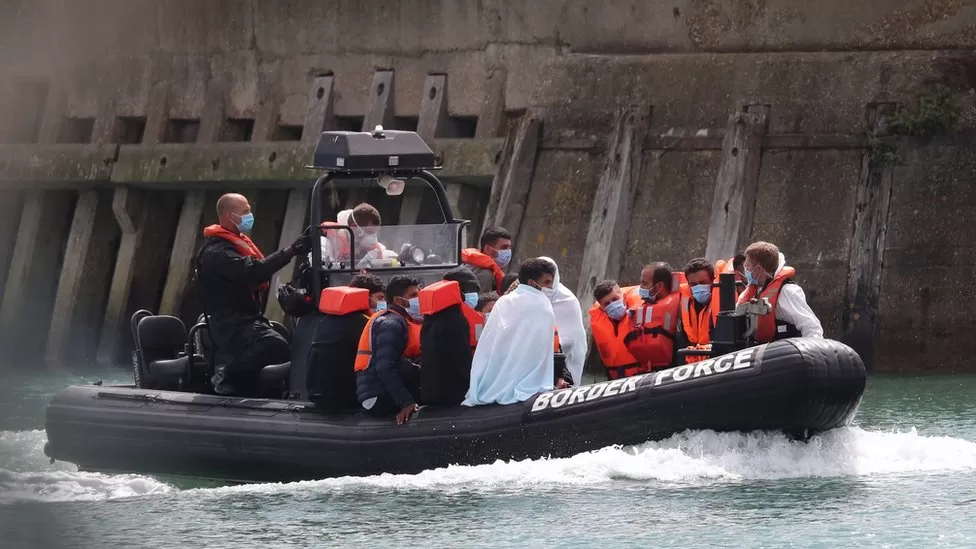The prime minister’s immigration speech in the Commons comes three years after his party won a general election telling people a Conservative government would take control of immigration. Just eight months ago, the government’s flagship immigration bill promised: “to fix our broken asylum system”. Let’s look at some of the key things Rishi Sunak has now promised to MPs – and the challenges he faces.
“We will establish a new, permanent, unified Small Boats Operational Command.”
The prime minister says the UK’s policing of the Channel has been “too fragmented, with different people, doing different things, being pulled in different directions”. He now plans a “Small Boats Operational Command” to bring together military and civilian teams, coordinating intelligence, interception, processing, and enforcement. The new command will use “all available technology, including drones… and then prosecute more gang-led boat pilots”.

All of this, however, is already being done in some shape or form – the UK has a dedicated commander of operations against small boats – so it’s not clear yet what is changing. The government wants more prosecutions, but there are unprecedented delays in the courts so it’s not clear when and how all these proposed extra cases could be heard.
“These extra resources will free up immigration officers to go back to enforcement which will, in turn, allow us to increase raids on illegal working by 50%.”
We’ve asked the Home Office to clarify over what time this target applies. One element of this strategy is to resume sharing immigration status data with banks, so they can deny people access to accounts. But the Windrush scandal revealed how people who were either British, or had a right to be in the UK, had their lives destroyed because the Home Office thought they were illegal immigrants – or had no record of their true status. They lost bank accounts, jobs and homes. The latest progress report on correcting the mistakes of Windrush warned the Home Office earlier this year this problem has still not been fixed.
A Home Office spokesman said a “range of safeguards” had been introduced to the bank data-sharing process – including “an improved customer contact and resolution service for those who feel they may have been incorrectly impacted.”
“Over the coming months, thousands of Albanians will be returned home.”
It’s long been a mystery why the arrival of Albanians is such a problem for the Home Office. Ministers can sign an order that declares a particular country to be safe. Since 2003, Albania has been on that list of safe countries – and that should mean that anyone claiming asylum or protection can be quickly sent back there. The government says Albanian crime gangs have been abusing the process under which people can claim protection as a modern-day slave, and it wants to close loopholes – but the evidence for that claimed abuse is disputed.
“We are moving up to 10,000 people out of expensive hotel accommodation into low-cost sites like disused holiday parks and former student halls.”
There are more than 100,000 people in the asylum support system waiting for decisions on their cases. About 37,000 are in hotels because the Home Office ran out of homes to put them in. It ran out of homes as its case backlog grew (see below).
This government, like Labour before it in the 2000s, has faced significant local opposition to moving asylum seekers into dedicated centres. A plan for one in North Yorkshire fell apart after both this summer’s Tory leadership contenders refused to back it. Is that scheme and others now back on? Each centre will need planning permission – and that may mean more campaigns targeting MPs already worried about their seats.
“Early next year we will introduce new legislation to make unambiguously clear that if you enter the UK illegally you should not be able to remain here.”
Mr Sunak says this new law would mean that people could be “detained and swiftly returned” to their home country or somewhere else – meaning, in theory, Rwanda or an EU destination. The UN’s refugee agency says the government’s proposals would deny people access to the legal asylum system because of how they arrived. There is also speculation that the government wants to resurrect the “Detained Fast Track” – a Labour government scheme that was suspended in 2015 after critics won a legal battle to prove it was unfair. Supporters of DFT say it was valuable in weeding out unfounded claims quickly. By the way – the Rwanda scheme is still in the courts and there’s no deal to send people back to the EU because ministers did not include it in the Brexit agreement.
“We expect to abolish the backlog of initial asylum decisions by the end of next year.”
Part of the reason is that Home Office staff are taking longer and longer to deal with cases. Another is that since Brexit there has been a growing number of cases it officially won’t deal with, so they remain in limbo. (A post-Brexit rule change declared that people coming from the EU could be blocked from making an asylum claim and sent back to the safe country they had come from – but, as said above, the UK has no returns agreement with the EU). The challenge is basically enormous. In 2004 Labour’s PM Tony Blair set a far less ambitious target to complete more cases in a given period than new ones joined the pile. It took the Home Office two years to come close to hitting it.
![]()





